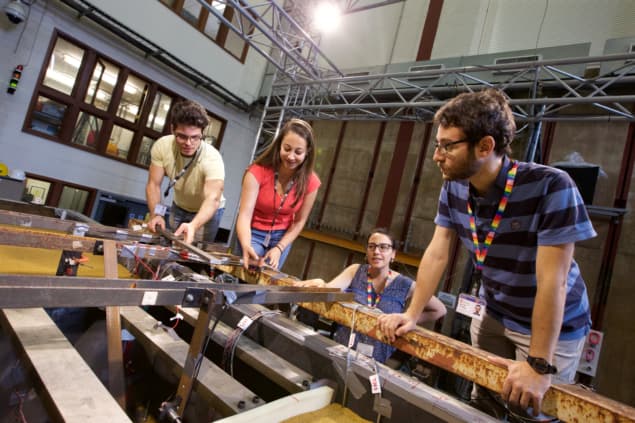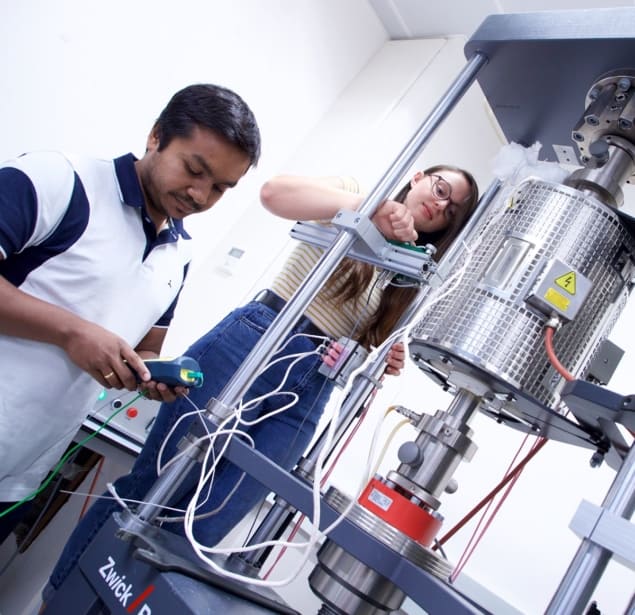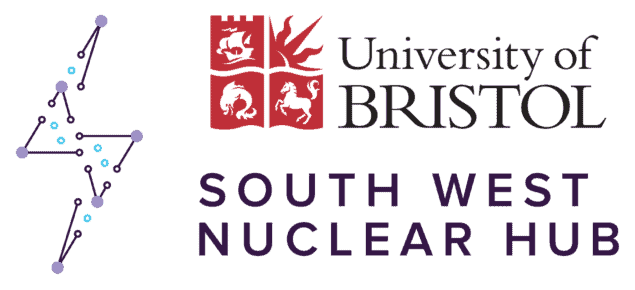
Ask three different people what they enjoyed most about a particular course, and the chances are you’ll get three different answers. But for Megan Taylor, Harvey Johnson and Graham Hemingway – all recent graduates of the University of Bristol’s Masters programme in nuclear science and engineering – the stand-out feature of the course is the collaboration it enables across disciplines and with external organizations in the nuclear industry.
“The best thing was my group research project with Sellafield, which involved four of us from different science and engineering backgrounds,” says Hemingway, who had previously studied an undergraduate course in aerospace engineering. “They came to us with a real-world problem they were facing at the time, and we worked as a group to devise and develop a practical solution. The people from Sellafield thought our proposal was really good, and it was a great opportunity to interact with industry and understand some of their challenges.”
Johnson, who previously studied chemistry at Imperial College, London, and is now working for multinational technical consultancy Fraser Nash, agrees that the group project offered a genuine insight into what it’s like to work in the nuclear industry. “All the team work, communication and business skills needed in the group project perfectly equips you for a real work environment,” he says. “You never work on your own or within a single discipline in the nuclear industry because problems are fundamentally multidisciplinary. You’re always working in teams with people from right across the academic spectrum.”
Collaborating with students from different science and engineering backgrounds was a particular high-point for Taylor, who had studied mathematics prior to joining the MSc. “There were people from physics, chemistry, and engineering, and I was from maths,” she says. “It was really interesting to have people with different scientific strengths coming together and sharing their knowledge and experience.”
Support across subjects
As well as the group research project, students who had studied different disciplines at undergraduate level were able to support each other throughout the course. “That was such a wide range of subjects that we could help each other with, because someone would really understand it well and could help everyone else,” Taylor continues. “I’ve gained so much more knowledge than when I started, and over such a wide range of topics as well.”
The MSc set me up really well, because the industry connections gave me a really good understanding of the problems and challenges in the real world, rather than just theoretically or academically
Graham Hemingway
That multidisciplinary approach is a crucial feature of the course structure. Five compulsory modules cover the fundamentals of nuclear science and engineering – ranging from reactor design to nuclear safety – and then students can choose from a large number of optional modules to complement and supplement their existing knowledge. These optional modules are delivered by senior academics based in different departments throughout the university, including physics, chemistry and various engineering specialisms.
“I really enjoyed the variety – one day you might be learning about nuclear physics, the next it might be engineering,” says Hemingway, who particularly enjoyed some of the more physics-focused topics. “But although the subject coverage was quite broad, it was also really focused around our own individual development.”

Johnson agrees that the course lecturers offered valuable guidance to help students navigate the course and choose the best options. “There was very open and free communication with all of the lecturers,” he says. “It was very easy to talk to them, and they would give their honest opinion as to whether specific modules would be suited to me.”
For Taylor, that direct connection with the academics teaching the course convinced her to study for a PhD in Bristol University’s mechanical engineering department. “During the MSc I realized that I still loved doing maths,” she says. “One of course lecturers, Dr Mahmoud Mostafavi, told me that they were looking for some mathematicians to join their group in engineering, and I found it really interesting that they would want me to do a PhD in their group, rather than someone with more engineering knowledge.”
One of the course’s core strengths, according to Johnson, is that it helps students choose whether to continue their academic studies or to move into the commercial sector. “As well as the group project, the MSc included an individual research project that is much more independent – much more like the project you might do as part of a PhD,” he says. “Ultimately the two projects reflect the two paths that students might go down, either working in industry or working in research, really helps to decide which route to follow.”
Focus on industry
Johnson chose to take the commercial route, first with a strategy consultancy that helps international businesses to assess and exploit potential opportunities in the UK’s nuclear industry, and then with Fraser Nash – a large technical consultancy with core capabilities in nuclear power. “I discovered that I most enjoy using the skills I’d learned in my Masters and my undergraduate course to solve practical problems,” he says. “In my current role, I can work on a project and then see it implemented within six months or so. It’s about seeing the results go through.”
The science that underpins the nuclear industry is fundamentally interesting, and it is incredibly diverse in terms of the people who work in it and the projects you can work on
Harvey Johnson
Students who see their future in the nuclear industry have plenty of opportunities to interact directly with some of the largest players in the nuclear sector. Indeed, the Masters programme at Bristol is an integral part of the South West Nuclear Hub, an initiative that supports the UK’s nuclear industry strategy by providing a focal point for research, teaching and innovation in nuclear power. Industrial partners such as EDF Energy, Sellafield and the Nuclear Decommissioning Authority take an active role in the MSc, both through the group projects and through a series of guest lectures that ran throughout the course.
“For me the stand-out part of the course was the guest lectures,” says Johnson. “Senior people came in from across the nuclear industry – from licensed companies to operators and consultancies – and it was really interesting to hear their opinions and to see how they look at a situation. The guest lectures exposed us to all the different aspects of the nuclear industry.”
For Hemingway, the guest lectures played a pivotal role in helping him to find his niche within the nuclear sector. “I joined a two-year graduate scheme with an organization called nucleargraduates, and at the end I will be fully trained to be a nuclear inspector,” he explains. “I applied for the scheme because one of the guest lecturers was from one of the nuclear regulators, and it sounded like the work would be really interesting.”
As well as highlighting the opportunity, the MSc provided Hemingway with the knowledge and skills needed to secure his place on the scheme. “The MSc set me up really well, because the industry connections gave me a really good understanding of the problems and challenges in the real world, rather than just theoretically or academically.” Now that Hemingway is coming to the end of the two-year programme, he can look forward to an almost guaranteed job as a fully qualified nuclear inspector.
Into the workplace
For the course organizers, the ultimate aim is to train a new generation of scientists and engineers who have the skills and experience needed to support the diverse demands of the nuclear industry. And from the students’ perspective, the direct interaction with industry has enabled many of them to find jobs in the areas they want to work in. “I went to networking events I probably wouldn’t have gone to if I hadn’t done the course,” adds Johnson. “You really need to understand the nuclear industry to have meaningful conversations with people at these industry events, and the MSc provided me with a really good overview of what’s happening in the whole nuclear sector.”
Nuclear futures
For undergraduate students who may still be weighing up their future options, Johnson summarizes the appeal of the nuclear sector for him. “The science that underpins the nuclear industry is fundamentally interesting, and it is incredibly diverse in terms of the people who work in it and the projects you can work on,” he says. “It has enabled me to use my technical in skills in a more commercial and strategic environment, and I have loved every minute of it.”
- The minimum entry requirements for the MSc in Nuclear Science and Engineering is a 2:1 in a relevant science or engineering subject, and you can find out more about the course via the University of Bristol and/or the South West Nuclear Hub. Most students can apply for funding through a Postgraduate Master’s Loan.





